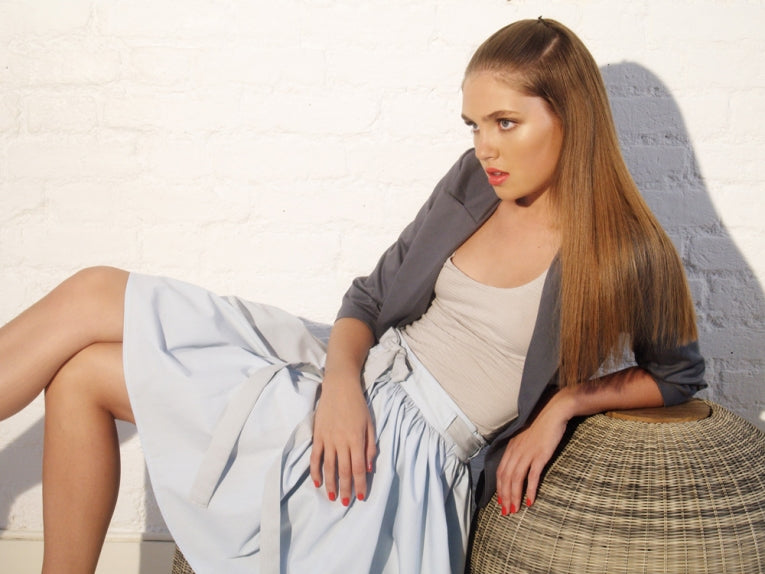Whilst there are some simple measures we can take to ensure our households are environmentally friendly, approaching eco-fashion can be more difficult. Unlike green living in the home, it is important that eco-fashion pieces are both aesthetically pleasing and functional; no one wants to be seen walking around in a hemp sack. However in many ways, buying clothes and accessories that are sustainably sourced can be one of the easiest ways to reinvent your lifestyle. From t-shirts to bags, to glasses and shoes, helping the environment needn't be a daily chore; eco-fashion opens up a world of choice for new style and individuality.
When shopping for eco-fashion, there are some 3 important things to consider. First of all, how is the product made? Take into consideration the conditions surrounding production, such as working conditions, waste management, water consumption and chemical usage. Some sites will offer a company bio pledging their dedication to the environmental and social cause, so take advantage of this to do some research before you purchase.
Second of all, what is the product made of? Look out for organic cottons and sustainably-sourced materials. These cause minimum harm to the environment and can help to provide a future for the natural world. Synthetic materials often require the use of many chemicals and pesticides in production. These chemicals may damage the local environment. The majority of organic cottons are also 100% biodegradable.

Castaway eco-friendly glasses; Credit: © Drift
Finally, is there any compromise on style or functionality? Today's fashion market is brimming with choice for fashionable eco finds, meaning it's possible to stay on-trend, whilst helping the environment.
For a wide range of natural, organic basics, Loomstate is a brand dedicated to caring for the environment with their soft tencel fibres. Tencel is derived from the cellulose of wood pulp from sustainably-sourced and organically-farmed trees. They offer a wide range of attractive, brightly coloured t-shirts for both men and women. All their products are 100% biodegradable.
But organic clothing is not just limited to everyday basics. For feminine, luxurious pieces, look no further than top eco-fashion brand, Amana. They approach styling with an innovative touch, offering beautiful designs, without neglecting the environment. All their garments are made of soft organic cotton or hemp mixes. In addition, Amana maintain a close relationship with their production staff to ensure they are provided with good working conditions and training. Each piece is crafted by a female artisan in Ain Leuh in Morocco, allowing Amana to oversee every stage of production.
For accessories, try looking at sunglasses brand, Drift. Their Castaway glasses are made of Forest Stewardship Council-certified woods such as walnut and maple to create unique, attractive and innovative designs. Unlike some other eco-friendly sunglasses brands, the Drift range openly boasts a rough, natural exterior. In addition, the acetate lenses are made of petroleum-free cellulose plastic, formaldehyde-free epoxy, and water-based coatings. This generous brand even donates 1% of profits to charity '1% For the Planet', meaning each pair contributes to preserving the planet for years to come.

Bridal shoes; Credit: © Beyond Skin
For stylish footwear, Beyond Skin is a cruelty-free shoe brand born in 2001 which offers a wide range of attractive flats, heels and boots designs, including a collection of beautiful bridal shoes which are all vegan and leather-free. Like Amana, Beyond Skin is keen to maintain a close relationship with employees, to oversee every stage of production. For this reason, they chose a UK-based factory. Celebrity ambassadors include Natalie Portman who wore their 'veggie' shoes for a red carpet event.
So if you're thinking about reinventing your lifestyle to ease your environmental conscience, eco-fashion could be a great way to start. In May 2012, the Nordic Fashion Association hosted a fashion summit, bringing together over 1000 fashion professionals to discuss the future for sustainable fashion. This marks the beginning of a promising future for eco-fashion, aiming to alter the mindset of consumers towards making sustainable choices.
When we buy a t-shirt or handbag from a high-street store, we may not consider the consequences on the environment and the employees of the brand. So next time you shop, ask yourself the three big questions about the brand and make your first steps to eco-friendly style.










